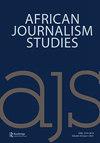Exploring Trust/Mistrust in Journalistic Practice: An Actor-network Analysis of a Kenyan Newsroom
IF 1.8
3区 文学
Q3 COMMUNICATION
引用次数: 0
Abstract
ABSTRACT The entry of non-traditional actors into aspects of journalistic practice has been widely explored in scholarship, as have expressions of the public’s trust in journalistic work. However, there is a scarcity of research addressing the construct of trust in relation to the interactions among traditional and non-traditional journalism actors engaged in news production. Through the use of actor-network theory and by applying qualitative case study design, this study focused on the nature of journalistic practice in a digitally disrupted Kenyan newsroom, and how trust/mistrust manifested itself within the actor-network of journalistic practice. Theoretical and thematic analyses established the social and technological actors that had joined the process of journalistic practice while four findings emerged addressing notions of trust/mistrust within the actor-network. These findings were as follows: trust occurs within an established routinized process; trust is enacted within a particular news media environment; new entrants in journalistic practice need to demonstrate value to gain trusted entry in the actor-network; and trust is engendered at institutional level but needs acceptance at individual level.探索新闻实践中的信任/不信任:肯尼亚新闻编辑室的行动者-网络分析
学术界对非传统行动者进入新闻实践的问题进行了广泛的探讨,公众对新闻工作信任的表达也是如此。然而,很少有研究涉及参与新闻制作的传统和非传统新闻行为者之间互动的信任结构。通过使用行动者网络理论和应用定性案例研究设计,本研究重点关注肯尼亚新闻编辑室中新闻实践的性质,以及信任/不信任如何在新闻实践的行动者网络中表现出来。理论和专题分析确定了参与新闻实践过程的社会和技术行动者,同时出现了四项研究结果,涉及行动者网络中的信任/不信任概念。这些发现如下:信任发生在一个既定的程序中;信任是在特定的新闻媒体环境中建立的;新闻实践中的新进入者需要展示价值,才能在行动者网络中获得可信的进入;信任是在机构层面产生的,但需要在个人层面接受。
本文章由计算机程序翻译,如有差异,请以英文原文为准。
求助全文
约1分钟内获得全文
求助全文
来源期刊

African Journalism Studies
COMMUNICATION-
CiteScore
1.90
自引率
10.00%
发文量
18
期刊介绍:
Accredited by the South African Department of Higher Education and Training for university research purposes African Journalism Studies subscribes to the Code of Best Practice for Peer Reviewed Scholarly Journals of the Academy of Science of South Africa. African Journalism Studies ( AJS) aims to contribute to the ongoing extension of the theories, methodologies and empirical data to under-researched areas of knowledge production, through its emphasis on African journalism studies within a broader, comparative perspective of the Global South. AJS strives for theoretical diversity and methodological inclusivity, by developing theoretical approaches and making critical interventions in global scholarly debates. The journal''s comparative and interdisciplinary approach is informed by the related fields of cultural and media studies, communication studies, African studies, politics, and sociology. The field of journalism studies is understood broadly, as including the practices, norms, value systems, frameworks of representation, audiences, platforms, industries, theories and power relations that relate to the production, consumption and study of journalism. A wide definition of journalism is used, which extends beyond news and current affairs to include digital and social media, documentary film and narrative non-fiction.
 求助内容:
求助内容: 应助结果提醒方式:
应助结果提醒方式:


